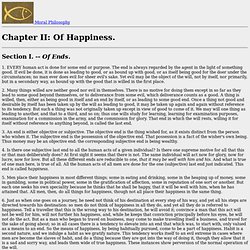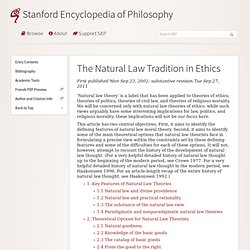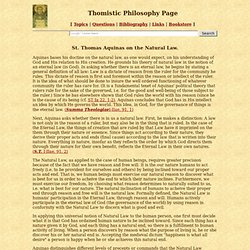

Natural Law. Thomas-aquinas. POWERPOINT Natural Law interactive. Level 3 Reading. Moral Philosophy Section I. -- Of Ends. 1.

EVERY human act is done for some end or purpose. The end is always regarded by the agent in the light of something good. If evil be done, it is done as leading to good, or as bound up with good, or as itself being good for the doer under the circumstances; no man ever does evil for sheer evil's sake. 2. 3. 4. 5. 6. Readings. -- St. Section II. -- Definition of happiness. 1. 2. 3. 4. 5. 6. 7. "Such a life will be too good for man; for not as he is man will he so live, but inasmuch as there is a divine element in his composition. 8. 9. 10. 11. 12. 13. 14. 15. Readings. -- Ar., Eth., I., vii.- viii., 5 to end; I., x., 8 to end; I., v., 6; VII., xiii., 3; IX., ix.; X., vii.; X., viii., 1-10; Ar., Pol., IV. Section III. -- Happiness open to man. The Natural Law Tradition in Ethics.
First published Mon Sep 23, 2002; substantive revision Tue Sep 27, 2011 ‘Natural law theory’ is a label that has been applied to theories of ethics, theories of politics, theories of civil law, and theories of religious morality.

We will be concerned only with natural law theories of ethics: while such views arguably have some interesting implications for law, politics, and religious morality, these implications will not be our focus here. This article has two central objectives. First, it aims to identify the defining features of natural law moral theory. Second, it aims to identify some of the main theoretical options that natural law theorists face in formulating a precise view within the constraints set by these defining features and some of the difficulties for each of these options. 1. Even though we have already confined ‘natural law theory’ to its use as a term that marks off a certain class of ethical theories, we still have a confusing variety of meanings to contend with.
Powerpoints. Natural Law Games. Summary. [ Topics | Questions | Bibliography | Links | Bookstore ] St.

Thomas Aquinas on the Natural Law. Aquinas bases his doctine on the natural law, as one would expect, on his understanding of God and His relation to His creation. He grounds his theory of natural law in the notion of an eternal law (in God). In asking whether there is an eternal law, he begins by stating a general definition of all law: Law is a dictate of reason from the ruler for the community he rules. Next, Aquinas asks whether there is in us a natural law. The Natural Law, as applied to the case of human beings, requires greater precision because of the fact that we have reason and free will.
In applying this universal notion of Natural Law to the human person, one first must decide what it is that God has ordained human nature to be inclined toward. Aquinas distinguishes different levels of precepts or commands that the Natural Law entails. All of these levels of precepts so far outlined are only the most basic.